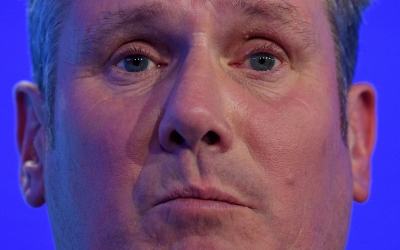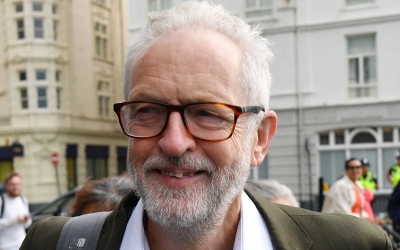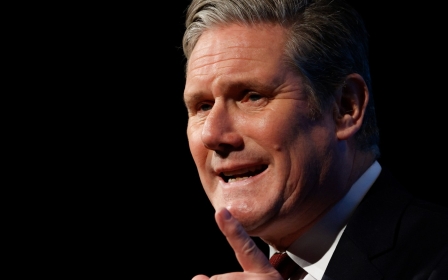UK Labour: Why Starmer's growing authoritarianism should be ringing alarm bells

Every so often, the UK Labour prime minister James Callaghan once remarked, there is a sea change in politics. This happened in 1979, when British voters lost faith in Callaghan's Labour party and put their trust in Margaret Thatcher. It happened again in 1997, when Tony Blair swept aside John Major.
And it is happening today.
Over the last few weeks, the authority of British Prime Minister Rishi Sunak has weakened considerably. The latest shambolic U-turn over net zero targets is the most recent example.
Sunak was heralded as a return to competence after the chaos of prime ministers Liz Truss and Boris Johnson. That narrative has exploded. Today, Sunak is an increasingly disliked leader stuck in the exit chamber of politics.
As Sunak's status has fallen, Labour leader Keir Starmer's ratings have soared. Starmer suddenly occupies the position of prime minister in waiting. Abroad, he is treated more seriously than Sunak - hence last week's visit to see President Emmanuel Macron in France.
New MEE newsletter: Jerusalem Dispatch
Sign up to get the latest insights and analysis on Israel-Palestine, alongside Turkey Unpacked and other MEE newsletters
And, crucially, at home, the mood has changed. Fawning profiles of Starmer are starting to appear. British political journalism has never been about holding politicians to account. It's about picking the winner and the worship of power.
In this article, however, we won't join the rush to praise the Labour leader.
Our objective is to raise the alarm.
Ruthless authoritarianism
The Labour leader's methods are authoritarian, anti-democratic and above all illiberal. We are in a position to state this with confidence because we have the evidence.
This month marks the first anniversary of Al Jazeera's The Labour Files, an investigation into factionalism and dubious practices within the British Labour party which drew on a vast leak of internal party documents.
Both of us worked on this series, which was entirely ignored by the British media. Today, with the Labour party on the brink of power, its revelations have assumed ever greater significance.
The series exposed a culture of brutal factionalism and ruthless authoritarianism on the right of the party, which controlled Labour's bureaucracy even during the first two-and-a-half years of former leader Jeremy Corbyn's leadership.
It revealed a party apparatus profoundly uncomfortable with the huge surge in membership that Corbyn unleashed.
Frequently, the response of local officials was not to debate and challenge the ideas of those entering the party, but to make allegations of misconduct.
Al Jazeera's The Labour Files showed that, in a number of instances, these allegations were outright fabrications. Nevertheless, the fiercely factional disciplinary unit at party headquarters was happy to nod through suspensions and push for expulsions.
Stories of homophobia, antisemitism and bullying were eagerly swallowed by the media, which portrayed the Corbynite base as a curious combination of working-class thugs and hyper-woke, out-of-touch metropolitans.
Al Jazeera did what the British media failed to do - it went and spoke to those accused.
Questionable legality
It found elderly Jewish ladies accused of antisemitism, the parents of bisexual children accused of homophobia, and a host of perfectly respectable, responsible trade unionists, community workers and ordinary party members bewildered by the allegations levelled against them and distraught at their utter powerlessness to refute them.
The complicity, complacency and sheer incompetence of much of the media was shocking, and it's scarcely surprising it opted not to report on an investigation that exposed it.
With the election of Starmer as party leader, this toxic and undemocratic culture returned - with a vengeance.
Under Starmer, the party has proscribed a number of left-wing groups. Members can be expelled for expressing support for these organisations, even if they did so before they were proscribed.
This purge of the left - even Diane Abbott, Britain’s first black woman MP, has had the whip withdrawn by the parliamentary party - goes far deeper than under Blair
If this seems patently unjust, the party has been careful to guard itself against any legal challenge.
A new clause in the party's rulebook reads: "Neither the principles of natural justice nor the provisions of fairness... shall apply to the termination of party membership" - an astonishing assertion for a democratic party and one that is surely of questionable legality.
Members have a right of appeal against expulsion. But so far not a single appeal has been successful.
However, such is the wave of suspensions and expulsions, and so crude has the interference of the party HQ in the selection of candidates become, that concern is beginning to creep beyond the radical left.
Even the Guardian - effectively the in-house journal of anti-Corbyn Labour before 2020 - is becoming queasy. In July, the paper opined in an editorial that Labour's "crackdown on free thinkers" was "bad for the party and politics".
This was prompted by the start of disciplinary procedures against Neal Lawson, director of the think tank Compass, whose crime was to support tactical voting and whose prosecution signalled that the purges now extended beyond the radical left.
Michael Crick, former political correspondent for both Channel 4 and the BBC, recently wrote an article entitled "Starmer Will Regret Purging the Left".
Under current criteria for selection of parliamentary candidates, Crick wrote: "It's unthinkable that Neil Kinnock, John Prescott, Clare Short and Robin Cook, all of whom were rebels in their early careers, would be selected."
He added: "It's a mistake to confine one's government to a narrow band of loyal yes-men and women."
Jamie Driscoll, the popular Labour mayor for the North of Tyne, interviewed recently by Unherd, identified a division within the leadership.
"There are those who are absolutely focussed on the polls and say whatever we need to win an election... But then there are those who are just factional warriors, wanting to settle scores. And I think it was that side that did it," he said, referring to his own deselection as a candidate for forthcoming elections.
This purge of the left - even Diane Abbott, Britain's first black woman MP, has had the whip withdrawn by the parliamentary party - goes far deeper than under Blair.
Middle East Eye understands that, internally, senior officials tend to dismiss critics of the party's growing authoritarianism as "cranks", or as having allied themselves with "cranks" - a term that seems to have replaced "Trot" as the go-to insult for those the party's bureaucracy deems dangerously left wing.
The Labour party did not respond to a request from Middle East Eye for comment.
Brutally pummelling the left
To the dismay of many of his initial backers, Starmer is revealing himself as a profoundly illiberal politician - something, his critics would say, that was already clear to anyone who studied his period as director of public prosecutions between 2008 and 2013.
Starmer's (unsympathetic and hostile) biographer Oliver Eagleton tells the chilling tale of how Starmer flew to Washington to apologise after Theresa May intervened to block the US extradition request of a young autistic man, Gary McKinnon, who had hacked into the CIA's database in search of information about UFOs.
Labour remains 20 percent ahead in the polls, and Labour's internal politics matter little to most voters. But progressive parties work best when there is at least some sort of balance - the left providing the energy and passion, the right cold realism.
In the US Democratic party, the right tends to be in the ascendant. But its leaders rarely define themselves against the left, and President Joe Biden has incorporated many radical elements into his presidency.
In the Labour party, not only is the right in control, it is brutally pummelling the left into the dirt, determined that it will never again wield so much as a shred of meaningful influence within the Labour movement.
At the start of the first programme in The Labour Files, a Merseyside activist, Paul Davies, posed a question:
"If a small group of secretive people manipulate and control one of the two great parties in Great Britain, what will they do when they have control of MI5? When they have control of all the levers of the state? Are they suddenly going to believe in justice and proper investigations and fairness? Or are they going to be the same as they are now? Or even worse?"
In Britain, a prime minister with a large majority possesses immense power.
Today, it is not just the Corbynite left who have a gnawing fear that the way Starmer runs his party may provide disturbing clues as to the way he will run the country.
The views expressed in this article belong to the authors and do not necessarily reflect the editorial policy of Middle East Eye.
Middle East Eye delivers independent and unrivalled coverage and analysis of the Middle East, North Africa and beyond. To learn more about republishing this content and the associated fees, please fill out this form. More about MEE can be found here.






